The Practicum
UBC Farm Practicum in Sustainable Agriculture
UBC Farm Practicum in Sustainable Agriculture
The UBC Farm Practicum in Sustainable Agriculture is an experiential learning program that runs April-October (or April-August for summer students) that provides an introduction to small-scale organic mixed vegetable farming for sale through direct markets. It is designed for aspiring farmers and community food growers, as well as those seeking to deepen their understanding of the food system and the pursuit of food sovereignty.
Students bring a diversity of backgrounds and life experience to the practicum. The program is open to all; you do not have to be a UBC student (see details below for minimum qualifications).

Breagha Zakaib on the partnership with Little Mountain
Yard Garden Harvest Coordinator at Little Mountain Neighbourhood House
“The Practicum was the highlight of my time at UBC. I learned so many new skills and realized how much more I enjoy hands-on learning. It was great to be able to have a discussion or guest lecture from someone and immediately go out on the field and put that knowledge into practice.”
37514
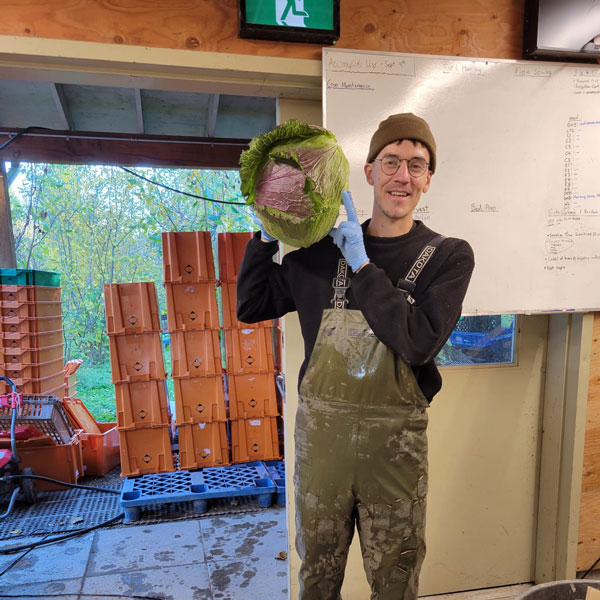
Nikolai Neun-Hornick
2022 graduate - Farm Manager at a farm in Richmond
I think if you are considering a career in farming, a program like the UBC Farm Practicum is vital to figuring out if it's the career for you.
37425

Megan Beveridge
2022 graduate – Field Supervisor for Sole Foods Street Farms
Farming has changed my relationship with my body, the earth and just really appreciate time. It is such hard work and not for everyone but I feel very grateful to be able to experience the seasons, build connection to space and place, and then connect with others over it all.
37414
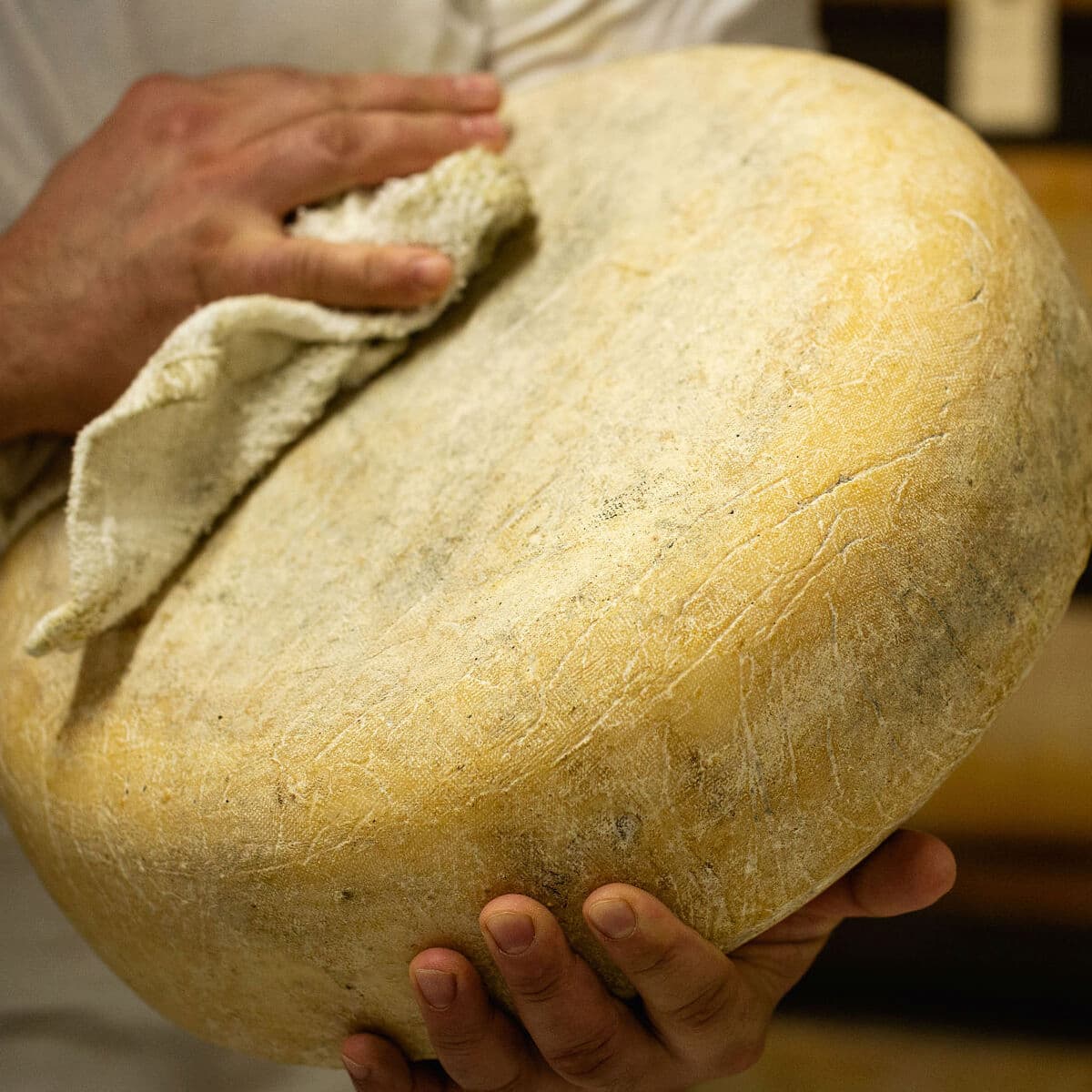
Cory Spencer
2009 Graduate of the UBC Farm Practicum - Founder of the Haltwhistle Cheese Company
A decade ago, Cory Spencer traded in his comfortable professional life as a software developer in Vancouver for a plot of land and a herd of goats. Now, nearly 11 years later, he wouldn’t change a thing.
31926
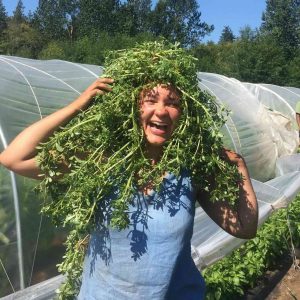
Alisha M'Lot
2018 Graduate - UBC Farm Practicum Field Mentor & Field Lead
After completing the practicum in 2018, Alisha M'Lot jumped right back into the UBC Farm community as a Field Mentor and Brassicas lead. She recently added hoop houses and tunnels to her portfolio at the UBC Farm, and spends her down time cooking farm veggies and hanging out with her deep-ecology book club.
25539
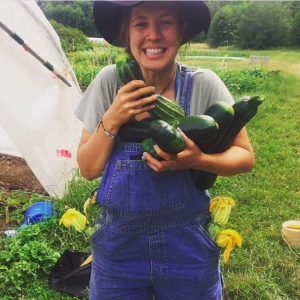
Brianna Thompson
2019 Graduate - Senior Plant Growth Operations Technician
After completing her practicum in 2019, Brianna Thompson went on to work with a research & technology company developing sustainable agriculture solutions. She also works as a coordinator for a produce and security initiative, coordinating yard gardens and purchasing excess produce from local farmers.
25545
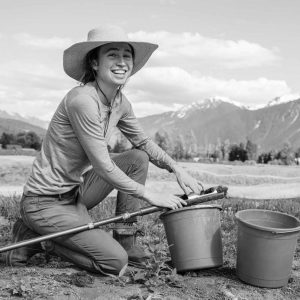
Amy Norgaard
2015 Graduate - UBC Sustainable Agricultural Landscapes Lab
Amy Norgaard wrapped up her practicum in 2015 while completing her BSc in Agroecology at UBC. From there, she went on to farmhand with Ice Cap Organics. In 2018, she returned to UBC to complete her MSc in Soil Science.
25549
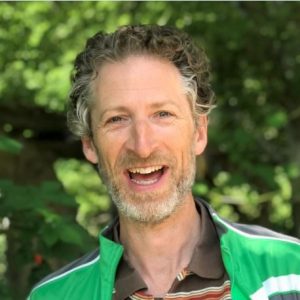
Gregg Ashby
2019 Graduate - Renewal Funds
After completing the practicum in 2019, Gregg Ashby went on to work for Renewal Funds, who invests in sustainable products and environmental technology. He also volunteers in urban agriculture, keeps bees, and serves on the Board of Richmond Beekeepers.
25534

Dave Semmelink
2014 Graduate - Lentelus Farms Comox Valley
Dave established Lentelus Farms about half way through UBC Farm’s Practicum in Sustainable Agriculture. The Practicum helped him build many strong connections including with Professor Emeritus and mentor Dr. Art Bomke. Dave now rents three farms in the Comox Valley.
9329

Katie Selbee
2013 Graduate - Twin Island Cider
After completing the practicum in 2013, Katie went on to do a year of mixed-vegetable CSA farming at Farmers on 57th. Katie has since moved to Pender Island, where she started Twin Island Cider, a farm-based cidery, with a fellow farm worker she met during her time at the UBC Farm.
9320
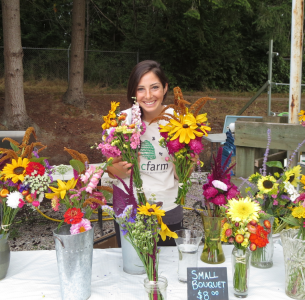
Samantha Gambling
2013 Graduate - Community Animator Farm to School BC
After joining the UBC Farm family in 2013, Samantha transitioned straight into a Master's degree where she studied agricultural policy and food sovereignty in the BC dairy industry. After graduating, she secured a job as Community Animator for Farm to School's Vancouver Area Regional Hub.
9312
37514
37425
37414
31926
25539
25545
25549
25534
9329
9320
9312
Application
For the 2025 program, we have two application pools:
- Full Program, April 17 – October 18, 2025. UBC students completing the full program are eligible to receive 9 academic credits via APBI 365 and APBI 465.
- Summer Option, April 17 – August 23, 2025. This is intended to accommodate the scheduling limitations of students currently enrolled at UBC or other institutions. There are limited summer program spaces. Only apply for this option if your schedule truly prohibits you from attending the full program. UBC students completing the Summer Option are eligible to receive 6 academic credits via APBI 365 (additional action is required). Priority is given to applicants intending to complete the full program.
Application for the 2025 cohort is now closed. Please contact Practicum Lead, Katherine Aske, at katherine.aske@ubc.ca if you have any questions.
Feeding the Community: How Little Mountain Neighbourhood House and the UBC Farm Practicum Are Tackling Food Insecurity
For four years, the UBC Farm Practicum in Sustainable Agriculture has partnered with the Little Mountain Neighbourhood House (LMNH) Food Hub to address growing food insecurity in Vancouver’s Little Mountain Community.
Each year, Practicum students donate hundreds of kilograms of fresh produce to the LMNH Food Hub, honing their skills in organic farming while contributing to an initiative that fosters community relationships, food justice, and food sovereignty.
Read the Full Story via UBC Community Engagement
About the Program
The Practicum program is hosted at the UBC Farm, a living laboratory of the Faculty of Land and Food Systems. For the 2025 season, the cohort will be made up of 15 students. The UBC Farm is the site of the majority of farming activities, guest speaker presentations, and classroom sessions. In addition, Practicum students visit a number of local farm operations in order to connect with other experienced growers and learn from their production methods. The UBC Farm encompasses 24 hectares of integrated farm and forest lands on UBC’s South Campus. The farm is managed by the Centre for Sustainable Food Systems, which offers a wide range of interdisciplinary learning, research, and community programs on the site.
The UBC Farm Practicum program is a hands-on educational program designed to provide a full growing season in small-scale organic mixed vegetable production to aspiring farmers, community food growers, and those seeking to deepen their understanding of food systems and the pursuit of food sovereignty. The program is designed to give an expedited introduction to small-scale organic vegetable production beyond what one might learn working as a new field hand on a for-profit farm operation. Though students should not expect to be capable of starting their own farms after just one season of growing, the program provides an introduction to topics and skills such as crop rotations, crop planning, soil management, irrigation, selling at a farmer’s market, integrated pest management, and farm business planning that will help prepare them for running a farm or food growing project in the future.
The curriculum is organized as a part-time, four- to six-month program balanced through the season with approximately 70% seasonal field production and direct marketing activities and 30% classroom sessions, faculty and guest speakers presentations, field trips, reading discussions and student presentations. Students learn primarily through their integration with the wider ~8 acre organic mixed-vegetable farm on site and the field staff who manage it, as well as through their own growing spaces where they have more autonomy, and where they will grow food for sale at their own Saturday market stand; for donation; and for themselves!
- Basic English fluency (as determined via the interview)
- Minimum age of 19
- Physical stamina to perform basic farming tasks over the course of the season
- Ability to stay and study in Canada for the entire duration of the program.
- A strong interest in learning how to produce organic vegetables for sale
- A strong interest in deepening your understanding of the food system and the pursuit of food sovereignty
This is a program for those at the beginning of their agricultural journey. Successful applicants are able to demonstrate their strong commitment to exploring food production and food systems learning. You do not need to be a UBC student to apply for the program, and applicants of all ages and backgrounds are encouraged to apply.
UBC students completing the full program are eligible to receive up to 9 academic credits (6 credits via APBI 365 and 3 credits via APBI 465). Summer option students (April-August) are eligible to receive 6 academic credits (via APBI 365). The cost of the credits is additional to the cost of the program, and costs the same as other LFS credits. Further action is required to obtain credits. If interested, please let us know in your application.
No. The majority of our practicum students are not UBC students. Acceptance to the UBC Farm Practicum in Sustainable Agriculture does not imply acceptance or enrollment at UBC. Practicum students do not pay UBC student fees, receive a student card, or have access to any of the benefits of being a UBC student.
Enrolled UBC students are certainly welcomed and encouraged to participate in the Practicum program provided the program schedule works with their academic commitments.
The full 2025 program costs $5,200. The Summer Option costs $3,950.
For those students offered a spot in the program, an $800 deposit will be due in November to secure your spot. The remainder of the tuition will be due early in the new year. The optional academic credits for UBC students will be an additional cost.
Participating in the UBC Farm Practicum program does not provide eligibility for student financial aid. However, thanks to the generous donation made by 2019 Practicum alumnus Greg Ashby as well as revenue generated through the 2023 Practicum students’ farmers market stand, we will be offering bursaries of $2,600, $2,000, and $1,000 to applicants on a rolling basis. The earlier you apply, the better your chances of receiving a bursary! The bursary application is built into the program application form. You will find out upon acceptance to the program whether or not a bursary is being offered to you as well.
In addition, we have worked to accommodate students of limited means to pay the program fee in two installments. If interested in this option, please notify us after acceptance into the program.
Yes. Most UBC Farm Practicum students do hold part-time jobs or pursue seasonal employment while participating in the program. That said, to get the most out of the program, many students plan for limited work hours during the busiest and most physically demanding June-September portion of the schedule.
The program meets from April 17, 2025 until October 18, 2025 (with the “Summer Option” beginning on April 17, 2025 and ending August 23, 2025). During this time period, the program meets Thursday-Saturday, for approximately 20 hours per week, beginning at either 8am or 9am.
To successfully complete the Practicum, we require 90% attendance of scheduled program hours.
Students must also plan for and commit to an average of 5-7 hours/week in additional time outside program hours to establish, care for, and maintain their individual and shared plot spaces, and to complete assignments. This extra time commitment is most crucial between May and August. Therefore, students should allocate roughly 25-27 on-farm hours each week to complete the program. There will also be required readings for several weeks throughout the season, as well as a few assignments, which will require additional hours at home. Students generally find the program requires more hours than they had anticipated.
We certainly welcome applications from international applicants, but we do not have the staff availability or resources to provide information or support regarding immigration, visa requirements, or housing.
No. At this time, we do not have any possibility of on-farm housing. If you are considering this program and are not from the Vancouver area, see http://vancouver.housing.ubc.ca/other-housing/off-campus-housing/ for resources.
Although the Practicum is not a degree program, students who complete all program requirements will receive a Certificate. In addition to the knowledge and skills obtained through the program, students often indicate that the program presented a valuable opportunity to integrate into the Vancouver and regional farming community.
We want to be clear that the fundamental nature of this program is introductory. The program serves a diverse demographic, and is not designed in such a way as to completely and fully prepare someone to immediately start their own operation upon completion of the program. While some graduates have, in fact, gone on to immediately launch successful farming businesses, other graduates continue their education in various ways, either through formal schooling, or by gaining additional work experience on other farms. Much depends on prior agricultural experience, access to land and capital, entrepreneurial skills and ambitions, and numerous other factors. Broadly speaking, we expect that the majority of students would plan for additional training prior to starting a farming project. That said, we believe the program provides a robust introductory training experience in small-scale organic mixed vegetable production, as well as vast array of resources and local connections to help facilitate Practicum students' agrarian journeys.
Alumni go on to start their own farming operations, obtain jobs on other farms, pursue advanced degrees related to agriculture and food systems, work in an educational capacity on farms and gardens, or work off-farm jobs related to creating a sustainable and socially just food system. Others pursue homesteading projects or grow food in community. View the above slides for specific examples of the paths of a few of our alumni.
We are always open and eager to hear from allied organizations and individuals. If you or your company/organization would like to support the Practicum program, please contact the Education Manager, Camil Dumont, at camil.dumont@ubc.ca.
Specifically, we are seeking:
- funding to support our bursary program to increase program access
- land access opportunities for program alumni
- funding to support purchase (or donation of):
- 15-passenger van (for field trips)
- farming / food system books & journals (for student library)
- additional equipment and hand tools
If our webpage and the program overview did not fully answer your questions, please send an email to the Practicum Lead, Katherine Aske, at katherine.aske@ubc.ca.